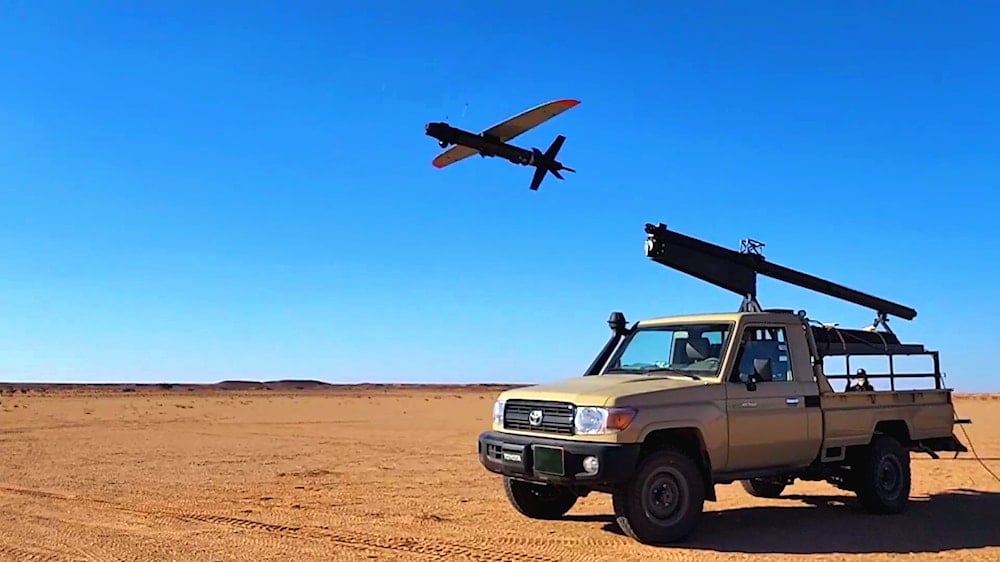Israeli firm opens factory to produce one-way attack drones in Morocco
BlueBird, an IAI subsidiary, has opened a SpyX loitering-munition production facility in Benslimane, Morocco, a move that deepens Rabat’s defense ties with "Israel".
-

A SpyX one-way attack drone is launched from a Toyota off-road truck, as seen in a promotional video published by BlueBird. (Social media)
BlueBird, a subsidiary of Israel Aerospace Industries (IAI), has inaugurated a factory in Benslimane, on the outskirts of Casablanca, Morocco, to produce the SpyX one-way attack drones, a development that shows "Israel’s" growing influence in Morocco’s security sector and deepens Rabat’s ties with Tel Aviv.
The new facility, described as the first of its kind in West Asia and North Africa outside Israeli-occupied territories, will locally produce the SpyX drone.
The SpyX is a loitering munition designed to strike personnel and armoured vehicles, including tanks.
The system carries a 2.5-kg warhead, reaches speeds of up to 250 km/h, and can conduct autonomous missions for as long as 90 minutes. It may also be piloted via a secure radio link, providing real-time video transmission to the operator throughout the mission. Its electric motor, powered by a battery, significantly reduces acoustic and thermal signatures, making the munition harder to detect. The platform is designed for rapid field assembly, and its warhead modules can be swapped easily to accommodate different mission requirements.
Moroccan personnel will be trained in assembly and maintenance as part of the project, signaling a transfer of skills alongside hardware.
Morocco tested the SpyX system in March 2024, and officials framed the factory’s opening as a step toward strengthening Rabat’s defense industrial base and reducing dependence on foreign suppliers.
Read more: Morocco, Israeli firm agree on $500 mln arms deal
A wider pivot toward Israeli defence suppliers
The BlueBird facility is one element of a deeper reorientation of Morocco’s procurement toward Israeli firms since the normalization of relations with the occupation in December 2020 was completed. Israeli media reports note several major purchases and cooperative projects attributed to Israeli industry.
Morocco signed a contract with IAI, reportedly valued at around $1 billion, for the supply of two Ofek 13-class military reconnaissance satellites. The deal was concluded at the end of 2023, with the contract formalized in mid-2024.
Deals also included the Barak-8 and Barak MX air defense systems, Rafael’s Spider, and Elbit/IAI guided rockets from the EXTRA family.
In parallel, Rabat has reportedly bought 36 ATMOS artillery systems and completed tests of 306 mm guided rockets with ranges up to 150 km and heavy warheads, moves that Western suppliers, including longstanding French defence partners, now see as diminished business opportunities.
Geopolitical and regional implications
The industrial link-up with Israeli arms companies will have strategic effects in North Africa.
For Rabat, access to Israeli unmanned and space technologies accelerates the modernization of its armed forces and creates domestic high-technology jobs and skills, further entrenching its pro-Western orientation.
On the other hand, for regional rivals, particularly Algeria and the Polisario Front, Morocco’s expanding strike and surveillance capabilities represent a concrete shift in the regional military balance, made even more consequential by the depth of Israeli backing behind these new systems.
The pivot is also a setback for traditional suppliers, particularly France, which for decades occupied a dominant position in Morocco’s defense procurement. Israeli firms’ deeper commercial and industrial ties with Rabat are eroding that angle of French influence while enlarging "Israel’s" footprint in the region.
Read more: India inaugurates armoured vehicle factory in Morocco

 3 Min Read
3 Min Read








